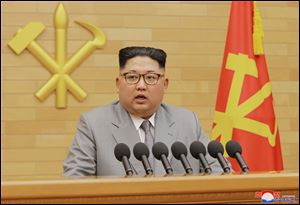
EDITORIAL
Hope in Korea
1/2/2018

In this photo provided by the North Korean government, North Korean leader Kim Jong Un delivers his New Year's speech at an undisclosed place in North Korea.
North and South Korean reconciliation is suddenly not a pipe dream. Prompted by the need for coordination of the upcoming Winter Olympics, a meeting, the first since 2015, was proposed Monday by North Korean leader Kim Jong Un.
Click here to view more Blade editorials
The North Korean dictator will meet with relatively new South Korean president Moon Jae-in, who ran for the presidency on a “let’s talk” platform, on Jan. 9 in the demilitarized zone.
The topics on the agenda are likely to include not only North Korean participation in the Winter Olympics, but the matter of Korean families divided by the border.
The first serious problem standing in the way of expanded and extended cooperation between the two Koreas is China, North Korea’s largest protector. The second is the United States, South Korea’s longtime ally.
China doesn’t want a unified Korea, dominated by an economically much stronger south, backed by the United States, as its neighbor.
The United States doesn’t want to give up its influence on South Korea and its economy, or its many bases, 28,500 troops, and frequent joint military exercises in the region.
It is also the case that North Korea has a border, albeit short, with Vladimir Putin’s Russia. What if a unified, capitalist, pro-American Korea were on that border? Mr. Putin would not be pleased.
All of that is for the future. In the short run, talks between the leadership of the two Koreas on subjects more immediate than strategic — like the Olympics and divided families — are most welcome. Such talk is greatly preferable to war talk.